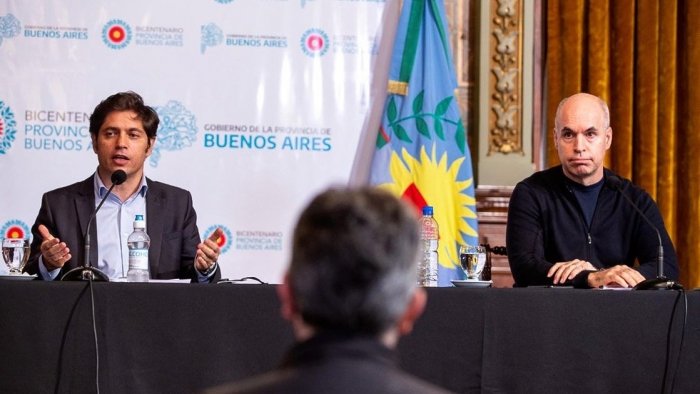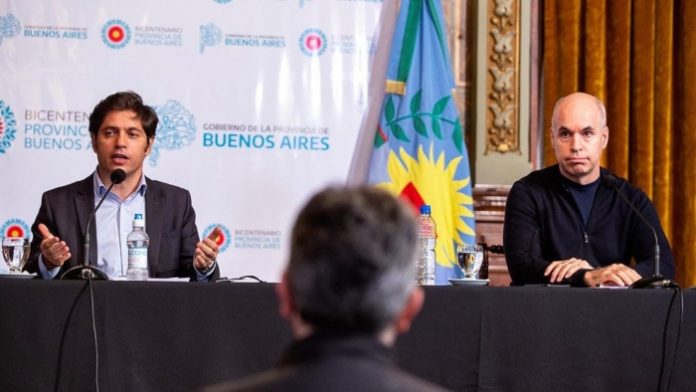
T
he governments of Axel Kicillof in Argentina’s province of Buenos Aires, and Horacio Rodríguez Larreta in the capital city of Buenos Aires, want online gambling to start as soon as possible. They need to add income to the public coffers after the economic downturn of the pandemic, to which inflation and the social crisis are added. They are ambitious to raise significant sums of money from one of the sectors that contributes the most to electoral campaigns.
According to reports, the authorities of the floating Casino Buenos Aires have launched initiatives encouraged by that push with promoters now receiving bettors as soon as they set foot on the riverboats, inviting them to register on their online platform.
In the offices of the gaming regulator in the province, the Provincial Institute of Lottery and Casinos, chaired by Omar Galurralde, they are cautious with the estimated collection numbers, while the Buenos Aires City Lottery (LOTBA) expects to contribute about US$ 6 million annually to the public treasury, based on what happens in other countries, where online bets represent between 5% and 7% of the volume of in-person bets.
Both governments know that they have fallen behind in comparison to other national jurisdictions since already twelve provinces have already enabled online gaming operations: Tucumán, Entre Ríos, San Luis, Santa Cruz, La Pampa, Chaco, Misiones, Neuquén, and Río Negro, in addition to Santa Fe, Mendoza and Corrientes (the latter did so during the pandemic).
Nevertheless, both Kicillof and Rodríguez Larreta’s teams know that they control the two districts most sought after by operators; and that, at least during the first stage, they will work as closed niches. In other words, Buenos Aires province residents will only be able to bet on authorized portals within the province, and Buenos Aires City residents will be limited to those authorized in the city.
In the province of Buenos Aires, the government of María Eugenia Vidal (former governor) promoted law 15,079 and moved forward with the selection of seven licensees for a period of 15 years, a process that was carried on by the Kicillof team.
Each license includes a local partner and a foreign counterpart: William Hill (together with “ArgentBingo”, in charge of Bingo Moreno), Bet365 (Bingo Berezategui and Bet365), Playtech (Casino de Tandil and Dynamo Tyche), Bplay (Boldt and 888), BetWarrior (from Binbaires and Intralot), Betsson (Casino Victoria and Grupo Bettson) and Pokerstars (Atlántica de Juegos, in charge of Bingo de Chivilcoy and Stars Interactive Limited).
However, Hugo Alconada Mon’s report considers that Atlántica de Juegos appears as the witness case that set off the alarms of the political class. Officially, the union of companies requested an extension to complete the bureaucratic procedures with the Buenos Aires Lottery; but low-key informed the authorities that they re-evaluate the steps to follow in the face of the local economic situation, the devaluation, and the dollar stocks.
“What is going to happen to the net profits of foreign companies? Will they be able to exchange said profits for dollars? Will we be able to transfer royalties to the headquarters of our partners? ”, expressed one of the businessmen aware of the deliberations that are taking place at this time and that, according to him, could delay the beginning of online operations “until next year”.
In the city of Buenos Aires, the situation although similar it has its differences. Among other reasons, due to the legal structure that governs that district, the Buenos Aires Legislature also passed a law in September 2020, but the City Lottery did not grant licenses, but “precarious use of permits” for five years, without setting a maximum limit of permit holders.
So far, the City advanced with seven “permits”, although the number may increase since those who obtained licenses in the province, as well as those who lost in that bid, want a slice of Buenos Aires. This is the case of Codere, which was left out of the province of Buenos Aires’ online business, but entered the Buenos Aires city district like Boldt, Betsson, Ibiza, Upline, Betway, and Ondiss, among others.
In both jurisdictions, they also agree that it is a matter of time and pragmatism. “Underground online gambling became very, very strong in the province during the pandemic. Therefore it is not a question of debating whether we enable online gambling, but rather of solving how we do it,” indicated a variety of sources related to Kicillof’s government. And from the Buenos Aires Lottery, led by Martín García Santillán, they offer examples of illegal gambling: only in recent years, they denounced before the Justice the existence of more than 950 websites that allowed online gambling without holding a permit.
Given all this, the National Directorate for Internet Domain Registration (nic.ar), dependent on the Presidency of the Nation, grants “bet.ar” domains to operators, and it will be sought that residents of the province of Buenos Aires may only be allowed to bet on websites with these domains, blocking, therefore, access to the rest.
It is also in the process of implementing how it will be verified that whoever claims to live in the province of Buenos Aires actually does so. “We will do it with Renaper (the national people’s registry)”, they indicated from Buenos Aires Province Lottery, alluding to the National Registry of Persons.
However, from the City Lottery, they aim at the geolocation of users. The “permit holders” must have systems that allow them to determine if the potential gambler is located in the city of Buenos Aires, regardless of their registered address with Renaper.
Regardless of those instrumental differences, however, the premise is that both districts go live at the same time. Also that they share technical parameters, to develop a single technological platform to which, in theory, the other provinces could adhere.
In both jurisdictions, they argue that online gambling would allow bettors to be more controlled and limit the risks of gambling since registration will be required, making it possible to track the time spent and amounts wagered and ban those who are minors or those that receive subsidies from the State.
Both jurisdictions agree that this is the first step in a process that will record mutations. A source who asked the journalist from the newspaper La Nación to keep their anonymity, said “there will be a very strong dispute between the football clubs, the online betting companies, and those in charge of televising the matches. The income amount will change completely, and they will have to renegotiate the percentages”. For now, however, and although some companies already advertise on certain team jerseys, the Argentine Soccer Association (AFA for its initials in Spanish) or the Professional Soccer League (LPF for its initials in Spanish) have not yet contacted those responsible for the lotteries.
Original article: https://www.yogonet.com/international//noticias/2021/11/08/60111-buenos-aires-city-and-province-online-betting-to-start-after-sundays-elections














